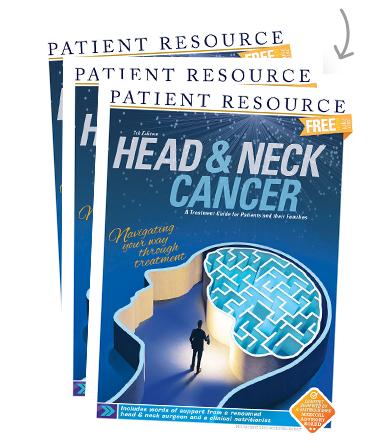Head & Neck Cancer
Dental and Oral Side Effects
Treatments for head and neck cancer may be accompanied by dental and oral side effects that can range from mild to severe. Before treatment begins, see a dentist who specializes in treating people with cancer to take care of any existing dental problems so they do not become worse during treatment. Then, continue to work closely with your health care team so you know the side effects to expect and strategies to help you manage or even prevent them.
The following dental and oral side effects are common and can generally be attributed to specific treatments (see Table 1).
Dry mouth, or xerostomia (zeer-oh-STOH-mee-uh), occurs when the salivary glands do not produce enough saliva because of damage from radiation therapy, chemotherapy or surgery. This condition is uncomfortable and increases your risk of both oral infections and tooth decay.
Infections are a greater risk for many reasons related to cancer treatments, including damage to mouth tissues, a lower white blood cell count (neutropenia) and a weakened immune system. These therapies, as well as steroids and antibiotics, can also alter the balance of bacteria in your mouth, making you susceptible to a fungal infection commonly called thrush. Confirm the symptoms that require a call to the doctor.
Jaw and/or mouth stiffness, also known as trismus, can be caused by surgery, radiation therapy or even stress. Often painful, it can interfere with healing and lead to malnutrition. Prevention is very important because the condition is difficult to treat. Ask your health care team about jaw muscle exercises, such as opening your mouth as far as possible without pain, then closing it to repeat. Medication may be used to relax your jaw and mouth muscles.
Mouth pain and soreness can make eating, chewing and swallowing difficult, preventing you from getting adequate nutrition. Pain can also slow the healing process. Controlling mouth pain is essential to the success of your treatment as well as your quality of life.
Mouth sores, or oral mucositis (myoo-koh-SY-tis), occurs when mucous membranes become inflamed. It is common with chemotherapy and is also possible with radiation therapy. Tiny sores begin in the mouth lining and become red, burn-like or ulcer-like sores, making it difficult to eat, drink or swallow.
Swallowing difficulties, called dysphagia (diz-FAY-jee-uh), and painful swallowing can make getting adequate nutrition a real challenge. Your health care team will determine the underlying cause, which could be related to treatment or to the cancer itself. You will likely be referred to a speech therapist to learn techniques that will help make swallowing easier. Drinking thickened fluids may also help. Call your doctor right away if you cough or choke while eating.
Taste changes are common after receiving radiation therapy to the head or neck because cells in the salivary glands and/or taste buds can become damaged. Your sense of smell may also be affected. The condition generally lessens within a few months after treatment ends.
Tooth decay and gum disease are likely. It is important to find a dentist experienced in treating cancer survivors. Discuss how frequently you should schedule routine dental visits.
Practical Suggestions
Some of the most effective solutions come from other head and neck cancer survivors. These suggestions may also help improve some of the common dental and oral side effects:
- Schedule regular dental visits to prevent tooth decay and gum disease.
- Check your mouth daily. Many problems can be seen or felt. The sooner you notice them, the quicker they can be managed.
- Rinse your mouth several times a day and after eating with a mixture of 1 tablespoon of baking soda in 1 quart of warm water.
- Even though you may not be using your mouth to eat as much or at all, brushing your teeth, flossing and caring for your gums should remain a priority. Use a soft-bristled toothbrush with a fluoride toothpaste every four hours and at bedtime.
- Use unscented lip balm to keep your lips from drying and cracking. Avoid oil-based products.
- Wear dentures that fit properly. Brush and rinse dentures every day.
- Avoid spicy, acidic and crunchy foods.
- Sip water often, and keep a water bottle and straw with you.
- Avoid alcohol and tobacco products.
- Use a non-alcohol-based mouthwash to avoid irritating your mouth lining.
- Use plastic utensils instead of metal ones to avoid the metal taste that may accompany chemotherapy.
- To enhance flavor, add extra seasoning to foods with spices.
- Use sugar-free lemon drops, gum or mints to help keep your mouth moist.
Table 1 - Dental & oral side effects by treatment type
| Treatment | Oral Side Effects* |
| Drug Therapy | Bleeding, dry mouth, infection, inflammation, mouth sores, pain and soreness, swallowing difficulties, taste changes |
| Radiation therapy (in the area where the radiation beams are aimed) | Breakdown of bone or tissue, dry mouth, growth of fibrous tissue or muscle, gum disease, infection, inflamed mucous membranes, jaw and/or mouth stiffness, mouth sores, pain and soreness, swallowing difficulties, taste changes, tooth decay |
| Surgery | Infection, jaw and/or mouth stiffness, pain and soreness, swallowing difficulties |
*Oral side effects listed alphabetically. Talk to your health care provider about what to expect with your treatment.



